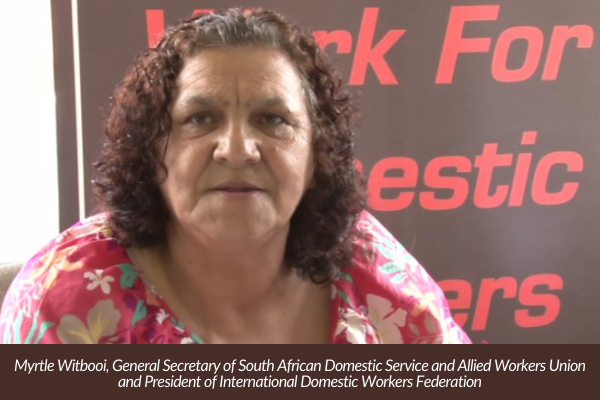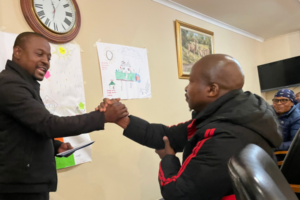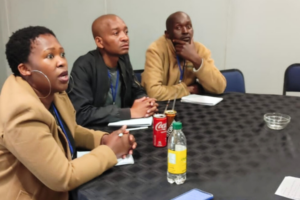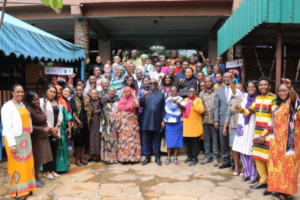*Naomi is still traumatised five years after returning from South Africa to her home country.
“You’d think I would be over it by now but am I still upset.”
She’s speaking about her experience working as a domestic worker in Cape Town. She’d arrived in South Africa in September 2013 brimming with hope. It turned out her boss, a human rights lawyer working with a UN agency, had lured her from her family with empty promises. For almost two years, she toiled under difficult conditions and without pay. Naomi would later discover that she was an illegal alien. Her employer hadn’t bothered to get the necessary work permit.
“What do you do when the protector becomes the abuser?” she asked.
Naomi’s question came to mind when I recently spoke with Myrtle Witbooi, the General Secretary of the South African Domestic Services and Allied Workers Union (SADSAWU). Myrtle, 71, has dedicated her life to giving a voice to domestic workers and advocating for their rights and protections. At least one million people work as domestic workers in South Africa, according to the
2015 report on the status of women in the South African economy. Like Naomi, many domestic workers are undocumented migrants, which makes them more vulnerable to exploitation and abuse.
The power of speaking out
What do you do when the protector becomes the abuser?
Naomi knew the answer to this question when she decided to contact a journalist and speak out. Decades earlier, a brave young woman had also spoken out and given hope to many women across South Africa. Myrtle Witbooi’s story embodies the power of speaking out.
When Myrtle began her quest in the 1960s, the standards for protecting domestic workers were low and unfair or did not exist. In many ways, the standards of work for domestic workers are below par. This is mainly because domestic workers are often ‘hidden’ in their employers’ homes, that is, their workplace. It’s not easy to organise people when they’re hidden and this perpetuates labour violations and incidences of abuse. But, thanks to the work of Myrtle and other activists, over 80,000 domestic workers in South Africa and now 600,000 more around the world are better off.
In the 1960s when I began working as a domestic worker, we weren’t allowed to question the master. One day I dared to speak up after reading a disparaging depiction of domestic workers in the local newspaper. I sent off a letter to the editor asking why people thought domestic workers are different. My employer was white and I wasn’t but we were two women in the house. So, why was I different? I remember the backlash that followed. How dare she raise such issues? How dare a domestic worker question the master? A reporter came to the house looking for that daring ‘nanny’ or ‘servant’. I told him there wasn’t a nanny or servant in the house. He told me he was looking for Myrtle, and I said I was she. He probably thought my employer had written the letter to the newspaper. Domestic workers are thought to be ‘voiceless, stupid and uneducated. The letter to the newspaper started my life’s purpose.
Domestic work was hard then and is still hard. During apartheid, we weren’t allowed to live with our families and I left my one-month-old son and my husband to move in with my employer. I had no rights and no voice. I worked for over a decade without a single paid holiday. I was a slave in my own country, and so were thousands of other coloured and black women.
I got many phone calls after sending the letter to the newspaper. My employer said I could use her garage on Sundays to meet with other domestic workers. I soon realised a lot of domestic workers couldn’t read or write. I was educated and planned to study nursing, but the circumstances in our country weren’t ideal for many people who sought to have a better life. Amidst our conversations about the issues affecting us at our workplaces and in the country, I started helping those who couldn’t read and write. From that garage sprung my life’s work fighting for domestic workers. Together with many like-minded women, we formed a domestic workers’ union. Because of my activism, I was locked up, separated from my three children and got divorced.
How South Africa’s domestic workers found freedom
In 1994 there was euphoria in the country. A new democratic government was in power and promises were made. But domestic workers felt sidelined. Domestic workers’ salary was as low as R110 per month and without pension or any benefits. We wrote to the government and nothing came out of it. It seemed the agenda of domestic workers was last! We were fed up and so we decided to challenge the government by protesting outside parliament. We took the fight to the offices of the department of labour and blockaded the minister until they started listening. Eventually, we got a wage increase, about R800 a month.
The
Labour Relations Act and the
Basic Conditions of Employment Act kicked in. But then unemployment hit and we were back to protesting. In 2003, an employment fund for domestic workers was launched. We felt fine, except we didn’t have a law that ensured we got compensation when injured at the workplace.
Today South Africa has great laws. Domestic workers have every law even though there are issues with implementation and exclusion from the workman’s compensation fund. We will continue to advocate for the rights and protections of all domestic workers globally.
Years later I found myself at the International Labour Organization (ILO) attending the annual conference. The conference gathers various parties, including government and business representatives. The agenda for the conference was to set the
standards for decent work for domestic workers. At the meeting, we found ourselves at loggerheads with business. They argued we couldn’t be given a law, that we were voiceless, and that we are part of the family. We were firm in our stance that domestic workers weren’t part of our employers’ families. After three years of talking and campaigning at the ILO, we won in 2011 with
Convention 189. C189 says domestic work is decent work. At the international stage, we’d been recognised as workers at the international stage. But would our governments give us the same and ratify the convention?
C189 isn’t easy to implement. Not as long as some governments delay signing up. Not as long as migrant workers are still exploited. Not as long as migrant workers are deprived of their identification documents. And that is the reality that we are facing.
How do we get C189 to work for all domestic workers in the world? We need to make all governments listen to us. One way of doing that is through you as our advocate. Everyone needs to understand why Convention 189 is important.
Taking C189 forward
In 2013, we formed the
International Domestic Workers Federation (IDWF) in Uruguay and I was elected president. The face of the domestic workers’ movement is very much female. The federation has proved to be successful. We have 67 affiliates (19 in Africa) representing over half a million domestic workers in 54 countries. Most of our affiliates are organised in trade unions, and others, in associations, networks and workers’ cooperatives. We want to ensure that all domestic workers have a home and a voice in the federation. We’ll penetrate difficult countries and tackle emerging issues. We will strive to address the problems faced by migrant workers. We will campaign to end gender-based violence.
What you can do to help the struggle of domestic workers
We want to see domestic workers treated with respect in every home. So the IDWF partnered with the ILO to launch the “
My Fair Home campaign”. My Fair Home initiative seeks to have employers of domestic workers commit to decent work.
Is your home fair? Let’s find out:
- Have you ensured fair wages and reasonable work hours for your domestic worker?
- Did you negotiate the terms and conditions of work with your domestic worker, and is the agreement in writing?
- Does your domestic worker have access to decent healthcare?
- Is your house free from abuse, harassment and violence?
- Does your domestic worker have decent living conditions and a safe, secure and private bedroom?
- Is she or he able to spend their free time wherever and however they choose?
If you answered ‘yes’ to these questions you are on the right track to having a fair home.
The struggle for domestic workers is far from over. Many are enslaved. Many do unpaid work. Others face abuse and violence. Exploitative labour brokers and agencies continue to thrive. My prayer is that one day all our domestic workers will be heard and be free. My prayer is that all domestic workers will one day speak out, be heard and be able to claim their rights. Challenge your employer from today by saying this: “I want to tell you what I think is a fair arrangement.” My prayer is that all migrant workers will work without restrictions, be heard and earn a decent living. Together we can free domestic workers.







